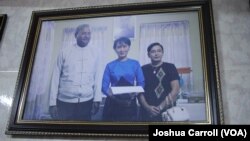The landmark trial of three men accused of plotting the assassination of a prominent Muslim lawyer will draw to a close Friday, more than two years since the killing sent shock waves through the country.
Ko Ni, a constitutional expert and close advisor to leader Aung San Suu Kyi, was holding his young grandson as he waited outside Yangon’s airport in January 2017 when a man walked up behind him and shot him in the back of the head.
Before his death, Ko Ni had been working on plans to loosen the military’s grip on power.
A Yangon court will rule on how to punish the gunman, Kyi Lin, who was caught on camera in broad daylight pulling the trigger, and will decide the fate of his alleged co-conspirators.
The prosecution has called for the death sentence for all three men, though they would likely never be executed.
Defense lawyers have argued for leniency for Kyi Lin and acquittal for the other two men, who are both former military officers, as well as a fourth defendant accused of harboring one of them.
The suspected mastermind of the plot, retired Lieutenant-Colonel Aung Win Khine, has so far evaded arrest.
Ko Ni’s eldest daughter, Yin Nwe Khine, said it is important for the country that her father gets justice, but the outcome of the trial will make little difference to her family.
“I want justice for my father, for everybody who faces such things. For everybody in our country who lost a loved one,” she told VOA. “It has to be, for the image of the country, for rule of law, for our country’s dignity.”
She does not plan to attend the hearing, she added.
Ko Ni used his legal expertise to try to help Aung San Suu Kyi find ways around the country’s military-drafted constitution, which has allowed the generals to maintain a stranglehold on power even after taking a back seat and allowing civilians into politics.
He had openly mulled amending or replacing the 2008 charter, which guarantees soldiers a quarter of seats in parliament, and therefore an effective veto over any constitutional changes.
It also allows the military to appoint active servicemen to key ministerial positions in border affairs, home affairs and defense.
Aung San Suu Kyi is barred from becoming president under the charter, but since her party took power in 2016 she has ruled the country from “above the president” as State Counsellor, a position that Ko Ni is credited with helping to create.
The assassination also underscored the precarious situation of Muslims in the majority Buddhist country, which is plagued by ethnic tensions.
Ko Ni’s status as a prominent Muslim who was also outspoken meant he was viewed as an enemy by ultra-nationalist Buddhists. Shortly after his death, infamous anti-Muslim monk Wirathu publicly thanked the killers on Facebook.
Yin Nwe Khine said her family is looking forward to the trial being over.
“We just want our personal life back, that’s all,” she said. “We are publicly known, it makes us very stressed. People stare at me. It makes me feel very uncomfortable.”
Observers have criticized the two-year legal proceedings, which involved dozens of pre-trial hearings, as sluggish and flawed.
The International Commission of Jurists last month pointed to multiple cases of “testimony that appears to be irrelevant” and key witnesses failing to appear.
Despite these criticisms, prosecution lawyer Nay La told VOA he believes it has been a “fair trial.”
Government spokesperson Zaw Htay declined to comment when contacted by phone on Tuesday.
David Mathieson, an independent analyst based in Myanmar, told VOA the proceedings have been “farcical.”
“I think after over 100 hearings and with some strange and irrelevant antics deployed by the defense, playing politics with the whole case while judges were swapped like playing cards, there can be no confidence in the verdict regardless of the results,” he said.







